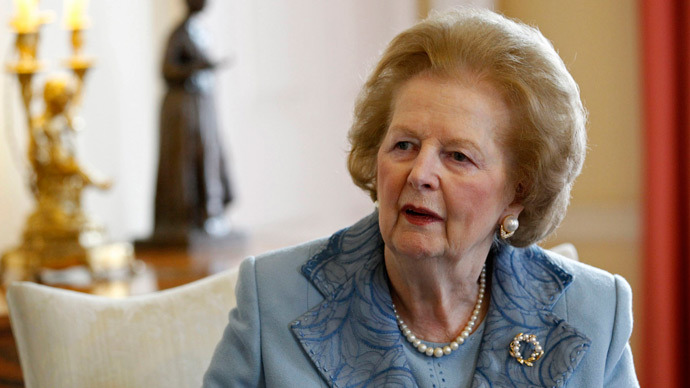Margaret Thatcher, and the man in the shadows

Eyebrows have been raised around the world to see Brits in their thousands dancing through the night in spontaneous street parties following the death of 1980s Prime Minister 'Iron Lady' Margaret Thatcher.
As the nickname suggests, she had a fearsome reputation round the world for hitting hard for Britain, but at home it was a different story. In the industrial North most knew several families who lost their livelihood on her watch. Londoners saw ominous shifting sands, homeless youngsters begging on the streets whom her regime had turned it's back on.
The taboo not a single commentator has broached though is the shadowy 'advisory' role played throughout her premiership by European banking fraternity's Labour peer Lord Victor Rothschild. He was revealed in the book the Thatcher government tried to suppress, Peter Wright's Spycatcher, to be behind London's top secret service appointments. In 1986 Rothschild penned 'Paying for Local Government' the policy paper that led to the notorious Poll Tax that fell hardest on the poorest, and which brought Britons onto the streets of London in their hundreds of thousands in 1990, riots echoing London's Poll Tax revolt of 1381.
And according to the then BBC Chairman Marmaduke Hussey, Lord Victor also initiated the sacking in 1987 of the last independent-minded Director General of the BBC, a castration from which the corporation never quite recovered.
One word captures the essence of the Thatcher legacy; 'privatisation'. As an exasperated former Tory Prime Minster Harold Macmillan put it "she's selling off the family silver!". And so tens of mind-boggling billions of pounds of silver were auctioned off to the highest bidders, mostly to Rothschild's kith and kin. From shipyards and public housing to telephones, steel, oil, gas and water, anyone in the world was free to own the infrastructure and manufacturing heart of Britain that was once collectively 'ours'.
Was this to pay the USA Lend-Lease second world war debts? To repay Britain's humiliating 1976 IMF loan? Or simply to fill the hole left in the national accounts after Thatcher dropped income tax on Britain's richest by more than half from 83% to 40%? Or was it just daylight robbery? When she refused to join the EMU, the forerunner to the vice-like Euro, she was promptly knifed in the back by those who sing her praises today.
Since Thatcher, City institutions have bought up much of our politics and mass media, leaving a post-industrial wasteland 'museum' of a nation where the Joseph Rowntree Foundation recently estimated six-and-a-half million British adults are being cruelly blamed, punished and made destitute for 'not wanting' full-time jobs, that don't exist.
Today the cracks that Margaret and Victor's turbo-charged crowbar opened up have become a chasm which is reawakening this nation's anger at injustice. The £10 million of taxpayers money being spent on Lady Thatcher's state funeral, by the millionaires for the millionaires, is rubbing salt in the wounds. Hundreds of thousands of Britons who know right from wrong will turn away and raise a solemn glass to the damnation of Margaret Thatcher and her 'rehabilitation of greed' this week, demanding better. The sleeping giant of the British public is rousing from its slumber.

As millionaire Prime Minister David Cameron reads the Christian
eulogy at Lady Thatcher's lavish funeral, those of Britain's ruling
class who still have something resembling a conscience will do well
to heed them.
Britain's first woman Prime Minister - the Margaret Thatcher timeline
1925 October 13 - Margaret Thatcher is born in the market
town of Grantham, Lincolnshire
1947 - Thatcher graduates from Oxford with a Chemistry
degree
1954 June 1 - Qualifies as a lawyer
1970 - Enters the Cabinet as Education Secretary
1975 February 11 - Elected Conservative Party leader,
beating Edward Heath.
1975-9 - Leader of the Opposition
1979 May 4 - The Conservative Party wins the general
election, Thatcher succeeds James Callaghan as PM
1979 December 13 - Abolition of Exchange Controls
1980 - Buses deregulated and bus routes privatised
1980 - British Aerospace partly privatised
1980 - April - Local Government stopped from building
council homes and tenants given the right to buy
1981 - March Prisoners at Northern Ireland's Maze Prison go
on hunger strike to regain status as political prisoners
1981 - April-July Urban rioting in Brixton in London,
Toxteth in Liverpool and St. Pauls in Bristol.
1982 - January Unemployment tops 3 million
1982 - April-June Falklands War
1983 - Associated British Ports (ABP) privatised
1983 - British Shipbuilding privatised
1983 June 9 - Second term as PM begins; the Conservatives
secure a landslide election victory
1984-5 - Miners strike, amid the closure and privatisation
of coal mines
1984 - British Leyland car manufacturers privatised
1984 October 12 - Narrowly escapes death after the IRA bombs
the Conservative party conference in Brighton, killing 5
1984 November - British Telecom (BT) the old Post Office
Telecommunications is privatised
1985 - Attempted suppression of former MI5 officer Peter
Wright's autobiography 'Spycatcher' which is then published in
Australia & Scotland.
1985 June 1 - Battle Of The Beanfield, Britain's traveller
peace convoy destroyed near Stonehenge, Wiltshire by violent police
action as recorded in the 'Operation Solstice' documentary
1986 - January Wapping dispute as Rupert Murdoch embraces
electronic publishing and breaks the power of print unions,
depicted in the documentary 'Despite The Sun'
1986 - British Airports Authority (BAA) privatised
1986 - March Abolition of Ken Livingstone's opposition
Labour controlled Greater London Council or GLC
1986 October 27 - Big Bang deregulation of the City of
London financial sector which many believe contributed to the 2008
financial crisis
1986 December - British Gas privatised
1987 January - After several TV and radio programmes
critical of the Thatcher government Victor Rothschild &
Marmaduke Hussey sack BBC Director General Alasdair Milne
1987 February - British Airways privatised
1987 - Majority share in British Petroleum (BP)
privatised
1987 - Rolls Royce aero engines privatised
1987 June 11 - Wins third term as Prime Minister
1988 - British Steel privatised
1989 - British Aerospace fully privatised
1989 - Water Boards privatised
1990 - The Electricity Act began the complex privatisation
of electricity (except nuclear)
1990 March 31 - Poll tax riots culminate in a 200,000 strong
march on central London, as portrayed in The Battle Of Trafalgar
documentary
1990 October 30 - Thatcher No!, No!, No! speech in Commons
makes it clear she is set against European Monetary and Political
Union
1990 November 13 - Geoffrey Howe resigns in protest at
Thatcher's refusal to agree a timetable for European Monetary
Union
1990 November 14 - Former cabinet minister Michael Heseltine
challenges Margaret Thatcher for the party leadership
1990 November 28 - Thatcher resigns, despite having won the
first ballot. She is succeeded by John Major
1992 - Thatcher leaves the House of Commons, joins the Lords
as Baroness Thatcher
1994 - Praises Tony Blair and New Labour as her proudest
achievement
2013 April 8 - Lady Thatcher dies in The Ritz hotel owned by
Daily Telegraph proprietors the Barclay twins.
The statements, views and opinions expressed in this column are solely those of the author and do not necessarily represent those of RT.
The statements, views and opinions expressed in this column are solely those of the author and do not necessarily represent those of RT.













